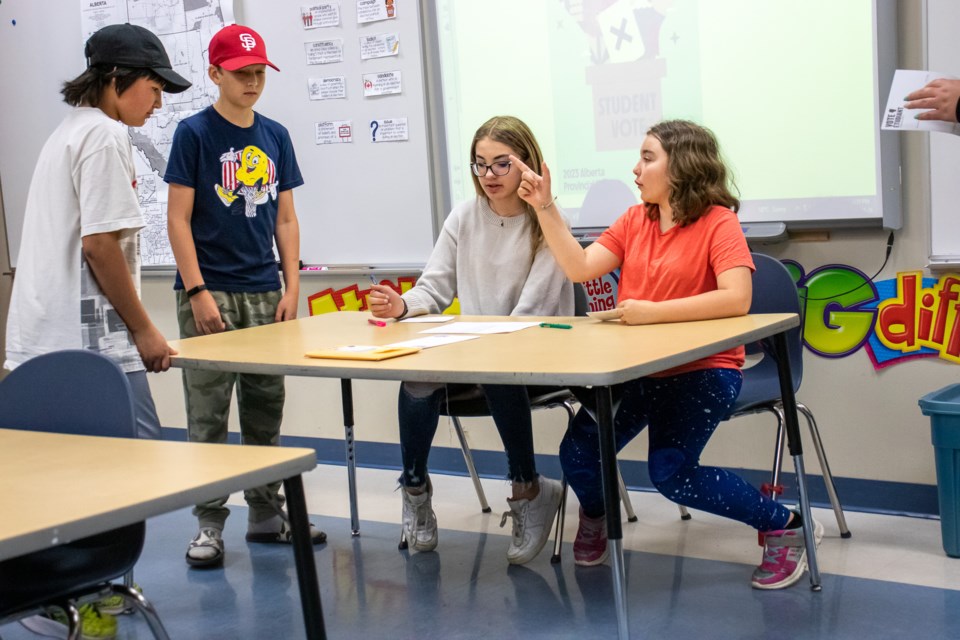ST. PAUL – The results are in. Over 170,000 elementary and high school students participated in Student Vote Alberta, weighing in on the 2023 Alberta Election campaign.
While the UCP won the majority in the actual election, local students saw things in a different light giving a majority win to the NDP with 48 seats, while the UCP formed the opposition with 38 seats, and one won a seat as an independent.
Organized by CIVIX, the experiential civic literacy program teaches students about government, election processes, and encourages research and discussion on issues and candidates.
Glen Avon
In St. Paul, Glen Avon School and St. Paul Regional High School participated in the student vote prior to election day.
Terry-Lynne Nickason, the Grade 6 social teacher at Glen Avon, said it is “vitally important for students to recognize that their voice,” and their opinions matter, expressed through a vote. She added that at the beginning of the program, students were “blown away” by how much the government affects Canadians’ daily lives.
Students also learned about government structure, policies and how they were formed.
Glen Avon Grade 6 students Alex Noel, Autumn Labrie, and Kiss Amigo were among the 49 participants from the school. Among the things the students learned are the 87 constituencies in Alberta, according to Noel.
Labrie added they also learned about how the second most seats would form the opposition, and Amigo noted how they also learned about the parties’ platforms.
According to Nickason, prior to voting, it is important for students to learn about the platforms of the running parties, including healthcare, education, natural resources, and how they differ.
Among questions posed by students during the learning process is, “How do you know who to vote for in the end,” according to Nickason. She reiterated, “I always say... think of the topics... that are important to you,” and look at the running parties’ platforms and how they address those issues.
“I don’t want the kids to come in with someone else’s opinion. You want them to have their own thoughts and ideas,” she said.
When Noel, Labrie, and Amigo were asked the importance of voting – speaking for the trio – Noel said voting is about having “our opinions out there.” The three students also expressed wanting to learn more about the civic literacy in their curriculum
St. Paul Regional
At St. Paul Regional High School, Social Studies teacher Carrie Foisy echoed Nickason, in that students were taught about democracy, the importance and process of voting, and how to be an informed voter – which includes going through the parties’ platforms.
“Student Vote allows them to get the practice in to see what it’s like to participate in the democratic process before they’re an adult. So then, hopefully, as an adult, they will participate in that democracy,” said Foisy.
According to Foisy, when the electoral process is brought up, many students do not fully understand how they work, “they’re not sure what” a party may stand for. “When they do hear tidbits, whether it be online or from the news, all they hear is... the back and forth and the bashing.”
What students truly want to hear, is “what the parties truly stand for.” Which is “why we go through those platforms and show them how to research online, [and] where to access the information,” said Foisy.
Students “want the knowledge” of what candidates are promising, and to see if they are going to fulfill those promises if they do get elected. “They don’t want to hear the back and forth and the chaos.”
According to Foisy, it is “fantastic” for students wanting that knowledge. “They’re critical thinkers and that’s what we’re trying to get out of our education system.”
Grade 12 student Tessa Bauer, who volunteered as a poll worker and collected ballots, as well as guiding other students when they cast their votes, said that she does want to hear more of the parties' platforms.
For example, in some instances, Bauer noticed how candidates may “just kind of put the other party down, which I don’t think is very helpful.” She added, “I wish [candidates] would be more straightforward," such as about their actual plans and goals.
When asked about what she learned about the election process, she said “it’s very important to actually vote,” adding that many people in her generation may not want to take the time to vote “because they don’t think it matters.”
But every vote matters, because “we have to have a say in how our country... our province... needs to be run,” said Bauer. It is also equally important for students to do their own research and look up at policies and topics important to them.
“That’s something I would really wish that people would take more initiative in,” which is to vote for “what they truly believe in,” and not to vote for what others may have told them to vote for, she explained.
Results
In the Bonnyville-Cold Lake- St. Paul electoral division, 23 schools participated in the Student Vote, with Scott Cyr representing the UCP winning with 1,278 against NDP Caitlyn Blake’s 826.



